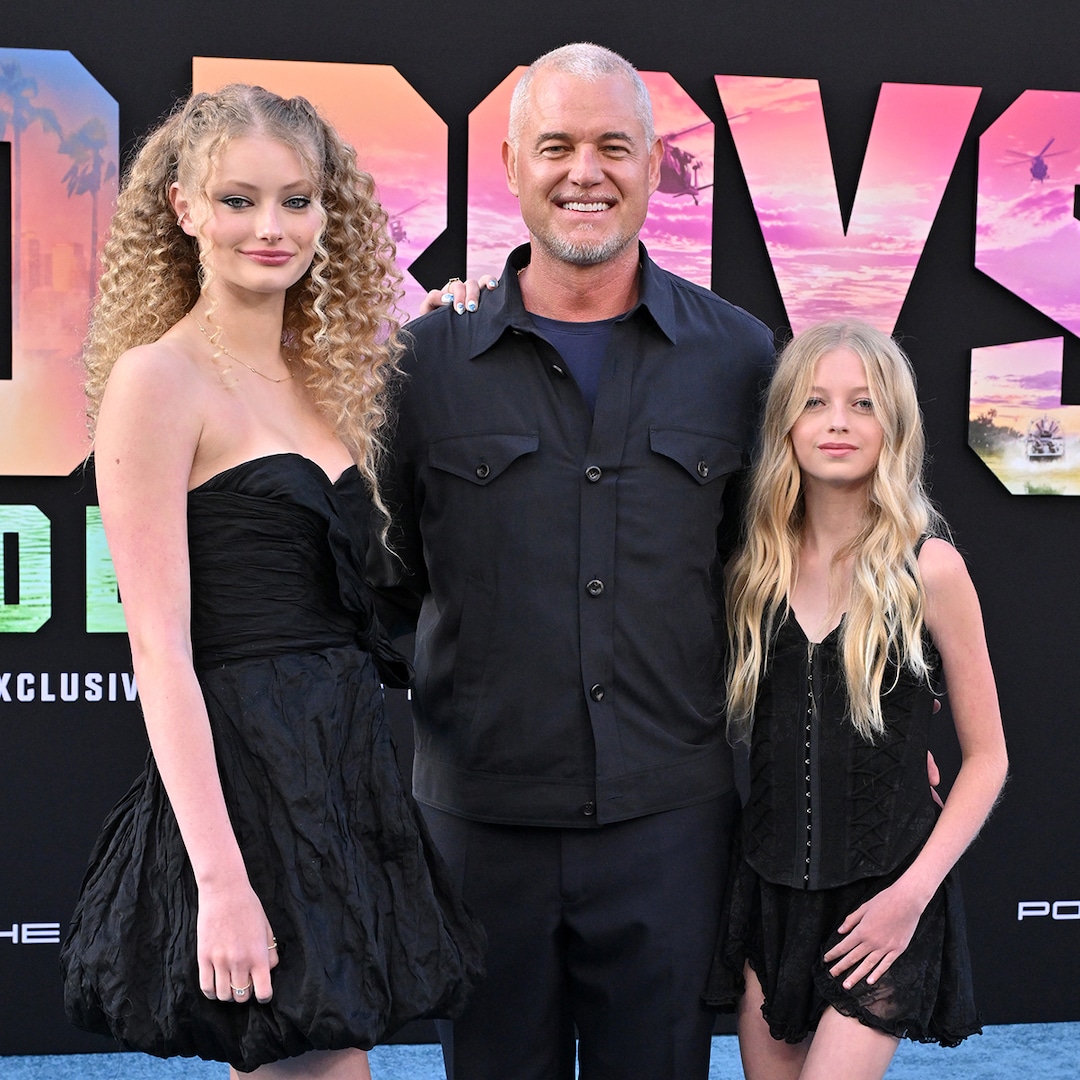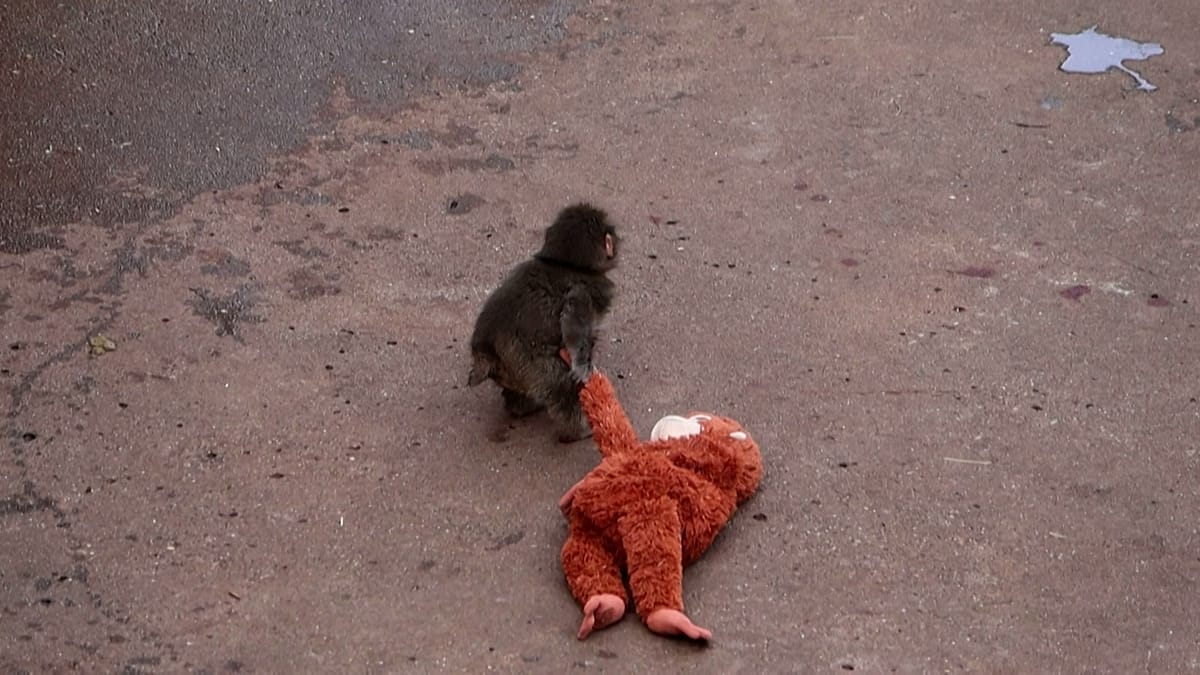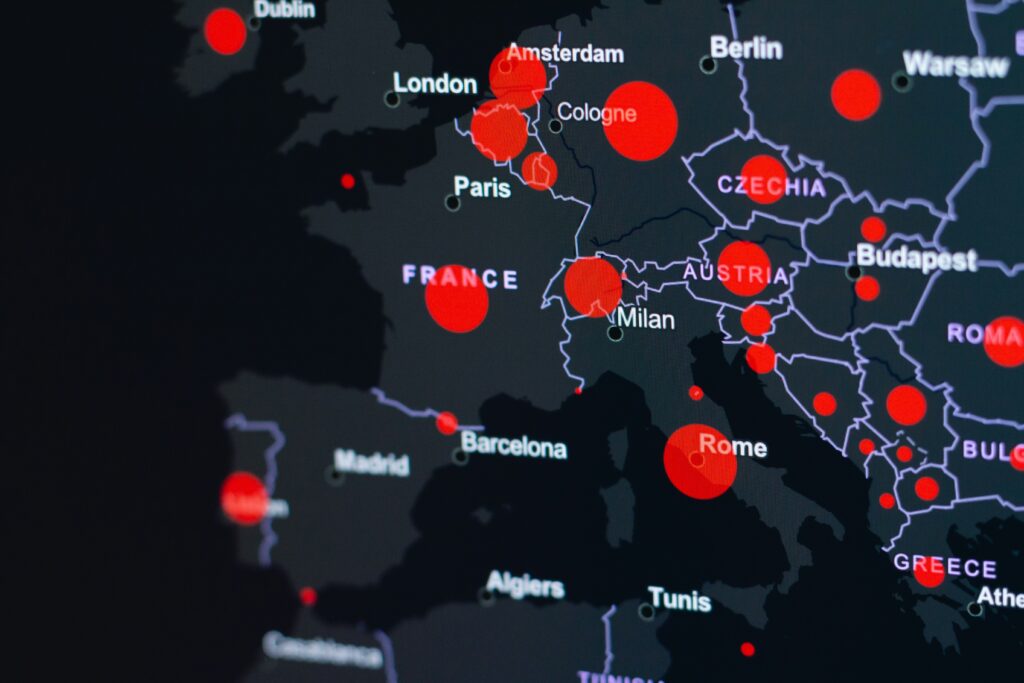Baby Steps isn't done with Maxi Boch

Maxi Boch isn’t done with Baby Steps. Boch has enjoyed a productive career in game development and she knows how it feels to be creatively finished with a project. She experienced it at various points with Rock Band, Dance Central, Fantasia: Music Evolved and Ape Out, but on Baby Steps’ launch day, done was not the vibe.
“I've been in the industry for a long time; I shipped broken strumbars for Rock Band,” Boch told Engadget. “I know that things change over time in this world, and it's not to say that Baby Steps is not done. It's done. But whether I'm done with Baby Steps, this is a different story.”
To make a long one short: Boch’s collaborators, Bennett Foddy and Gabe Cuzzillo, were ready and excited to ship the game before she was, and so they did. Baby Steps hit PC and PlayStation 5 on September 23, 2025 (following one strategic delay to avoid the Hollow Knight: Silksong release window).
From the player’s side, Baby Steps feels like a finely honed experience. It’s a walking simulator that follows Nate, a manchild in a gray onesie, as he attempts to scale a mountain and symbolically escape his parents’ basement. The player controls Nate’s legs individually, lifting each knee and carefully placing one foot in front of the other, learning how to walk in the very literal sense. Baby Steps succeeds because of its mechanical precision, but it excels because of its irreverent tone, magically surreal setting and AAA levels of polish. The mountain is a mix of childhood memories and adult anxieties represented by giant chess pieces, rude graffiti, and a crew of drinking, smoking, anthropomorphic donkeys who wander the cliffs with their dicks swinging free. Improvised dialogue between Nate and the NPCs turns each cutscene into a comedy sketch, but his journey also includes shocking revelations of existential numbness.
In Baby Steps, falling is just as much of a mechanic as walking. You will fall — dramatically, drastically, down crevasses that took hours to climb — and Nate will bounce and slide and eventually just lay there, mumbling to himself while his onesie fills with mud. And then you’ll pick him back up and start walking again. You’ll settle his steps into a soothing cadence. You’ll marvel at the way his sweat slowly saturates the material at the base of his spine, just above his bulbous butt. You’ll try to skip a cutscene and realize that in order to do so, you need to play a minigame with the X prompt. You’ll learn how to run. And somewhere along the way, you’ll remember what it feels like to just enjoy play.
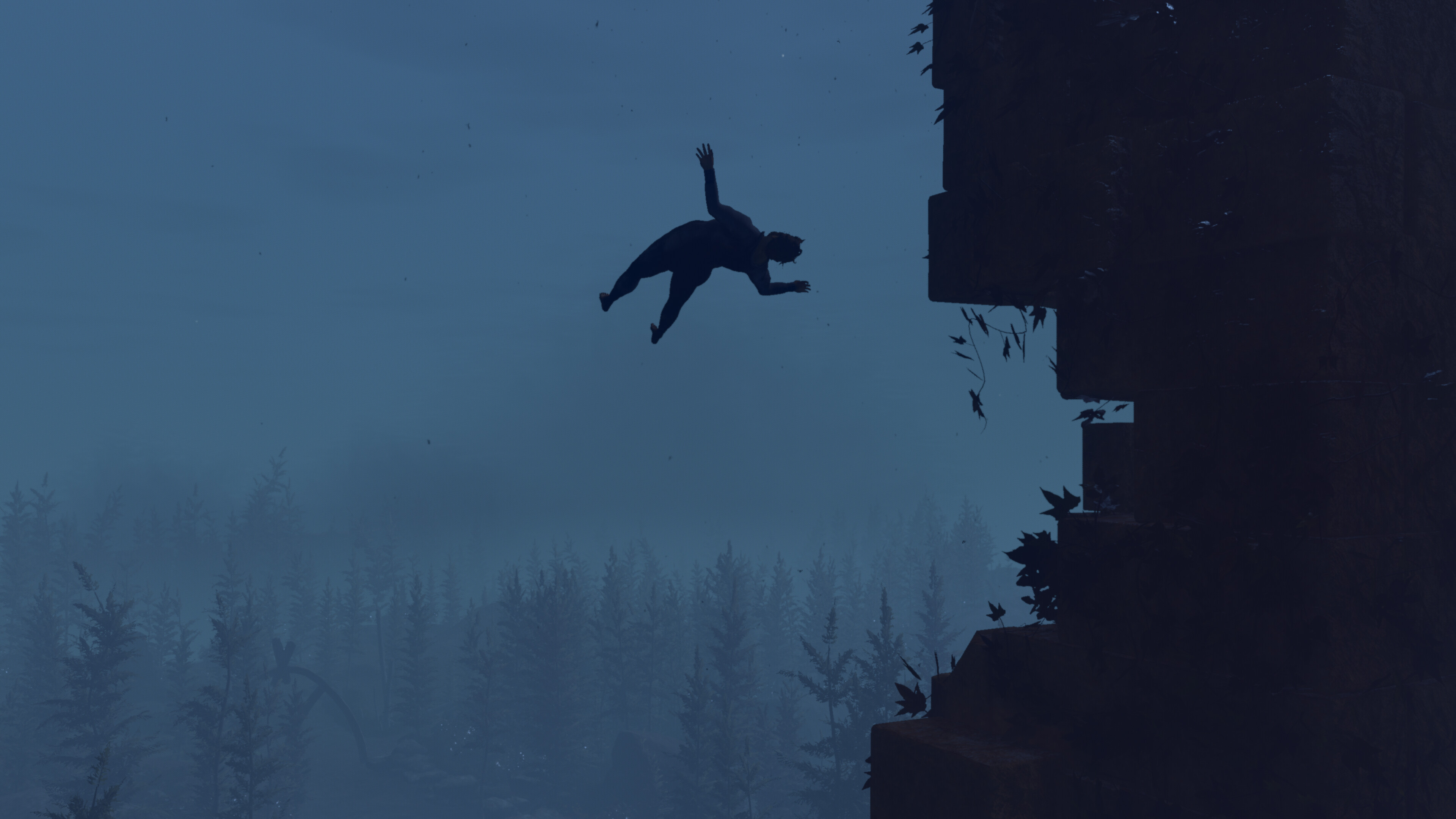
As a former marching band member, I appreciate the sense of rhythm that’s built into Baby Steps, spurred by the animal sounds and natural-world musical cues that are tied to Nate’s footfall in specific areas. This is Boch’s area of expertise, and also the main reason she doesn’t feel finished with the game. Boch and her collaborators ended up using a slapdash mosaic of audio middleware and low-level software for Baby Steps, and a series of late-stage issues infused all of the songs in the game with incorrect samples. On launch day, the music and audio cues weren’t reacting as intended when Nate stepped, stumbled and fell.
On September 23, the day that Baby Steps came out, Boch and I talked for an hour about its development process. Our conversation gently circled the topic of perseverance, the game’s core theme, but we only directly acknowledged it at minute 59. It’s not something you need to scream or repeat — tenacity is the obvious message in a game about climbing a mountain on wobbly feet — but it was fascinating to learn why Boch in particular was inspired to build a game about endurance.
Making Baby Steps
Boch, Foddy and Cuzzillo started working on Baby Steps right after they released Ape Out and cemented their names in the annals of frenetic, bloody and slightly silly indie history. Foddy was already known as the creator of QWOP, GIRP and Getting Over It, and Boch as the rhythmic and hardware mastermind behind the largest AAA music games of the mid-2000s. The trio worked out of Boch and Foddy’s shared office at the NYU Game Center, where they were instructors and Cuzzillo was finishing up a graduate degree with Ape Out as his final project. They began prototyping Baby Steps around March 2019.
“At that point, I also started manifesting more symptoms of my chronic illness, and so I was in the midst of a period of an attempt at really intense reconditioning, which ultimately failed,” Boch said. “But when that period was over, I joined up with the crew again.”
Boch lives with a trifecta of chronic illnesses: Ehlers-Danlos Syndrome, Postural Orthostatic Tachycardia Syndrome and Mast Cell Activation Syndrome. EDS is a connective tissue disorder that affects the entire body, and it can cause hypermobility, fatigue, vision issues, fragile skin and an increased risk of vascular ruptures. People with POTS experience an abnormally large increase in heart rate when changing posture, and MCAS is a disorder that releases excessive amounts of histamine and similar chemicals in the body, causing random and potentially life-threatening allergic reactions. It’s common for people with one of these diagnoses to also receive the others.
“It’s been an incredible challenge,” Boch said. “I think, easily, the hardest thing I've had to deal with in my life. I think there's something very singular about each one of us, the three core members of this crew, and part of that is our ability to work fluidly across disciplines and the like. But another part of it is just a level of stick-to-it-iveness that my body has handily rejected, and so I'm in a fight with it all the time.”
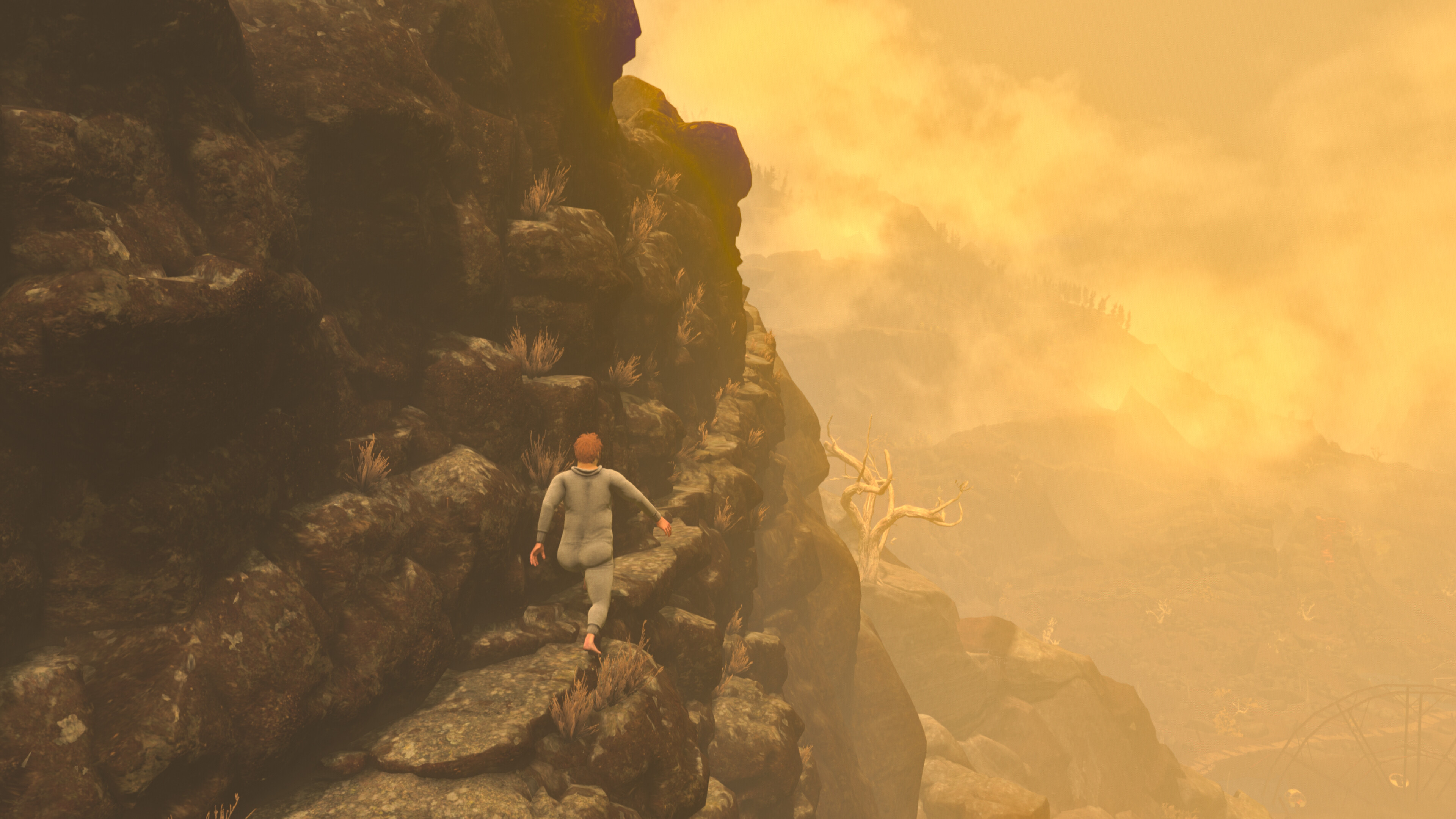
Boch has an arsenal of specialized tools to help her create games, including ergonomic (and very expensive) keyboards and a pair of glasses that act as a mouse.
“I have found that most of what game development is about and is oriented around is kind of hostile to those of us with poor fine-motor skills, and it's an odd thing to be experiencing alongside the making of a thing that is stridently difficult,” Boch said. “There's odd moments in it, where I have been going through physical therapy processes to retrain my actual walking, alongside working on this thing that is deconstructing walking. A very odd subset of feelings.”
Boch said the hardest thing for her to contend with is the moment-to-moment unpredictability of her health. But by the fall of 2019, she was back in the office with Cuzzillo and Foddy, iterating on the ideas that would eventually become Baby Steps. Cuzzillo and Foddy were feeling slightly discouraged at this point: They were four or five ideas deep, messing around with a competitive, real-time strategy game or a SimCity type of experience, but nothing was quite right. Boch encouraged them to return to their ridiculous, mechanically-driven roots.
“I think it started to become a lot clearer in everyone's mind when it started to take on aspects of Bennett’s work,” Boch said. “The first handful of years of Baby Steps’ development, we were all playing various sorts of roles. The work of VO direction, recording and narrative development was something we were all working on together. Some of the foundational narrative premise things are concepts that I brought to the table as ways to try and prop up some world around this character. Lots of tools building and infrastructural work and all of the foundational stuff that makes it possible for a team that's so tiny to make a thing that's so strong.”
The Baby Steps crew shared a house in upstate New York during the first winter of the pandemic in 2020. They hiked together and worked on the game at one big folding table, enjoying the mountain air with their partners and each other. There were no strict roles on the game development side, with Boch, Cuzzillo and Foddy contributing to all aspects at once, including voice work.
“Over time, there are aspects of the narrative development that became increasingly more personal to my collaborators,” Boch said. “And they started to feel more comfortable in a director-less environment in terms of coaxing naturalistic performances out of themselves, and so that work became more disjointed.”
By the time they were recording voices and finding characters through improvisation in the sound booth, Boch happened to be in the early stages of transitioning. Vocal training and voice acting are a tricky mix, it turns out.
“I kind of recognized what it was going to take to be doing voiceover performance myself in the midst of my early transition, and I made the call that it was not the right activity for me,” Boch said. “So my characters were cut — it was like one or two — and I endeavored to strike up some novel collaborations on the audio side.”
For the past year and half in particular, Boch has been focused on all things audio in Baby Steps, as well as overseeing big-picture production tasks. She brought on a collaborator from the world of hardcore techno music, Jack Schlesinger, and he primarily handled system architecture details while Boch dealt with creative aspects. DJ Ashe Kilbourne and harpist Emily Hopkins rounded out the list of audio contributors. When she was able, Boch took an improvised sound kit into the wild and collected nature noises, and the team stitched together a reactive audio system using middleware and leftover bits of software from the Harmonix days.
When Baby Steps’ dynamic audio kicks in, and the boops, chirps and thunks start layering on top of one another as Nate waddles along, it adds a delicious sense of hypnosis to the game. Unfortunately, the audio systems fell apart in the final weeks before launch. The VO was fine, but many of the sounds and beats weren’t populating in the right places at the proper times, and Boch’s vision wasn’t being clearly communicated day-one.
“The foundations of game audio tooling are terrible,” Boch said. She continued, “The world of game audio, from my perspective, is a bunch of people who are sitting on top of a bunch of work they've done to write drivers to talk to consoles, and a bunch of work they've done to forge relationships with console manufacturers so that their audio technology will be licensed by the two major engines. But they're both trash. I will not endorse either one, and I will not say that either one is capable of doing the kind of work that I need done.”
Since launch, the Baby Steps audio team has released patches addressing the sampling issues and adjusting dynamic audio cues across the game. An imminent update will introduce animals singing along with the songs, outdoor and indoor reverb simulations across all sounds, and other fixes. Boch has additional updates and surprises planned, including a Baby Steps Fi Beats livestream to showcase the game’s music on YouTube. By November, the audio team will be focused on composing.
Baby Steps is only going to get more immersive as the audio improvements roll out. And if you listen closely, you’ll be able to hear Boch voicing a few small roles throughout the game.
“I play, like, a baby and a hypothetical gay partner for Nate and a bunch of other random characters,” Boch said. “There's some cosmic sadness on my part, that the timing worked out in exactly the ways that it did. But I don't know, it's the cards you're dealt. It's important to do the thing that's true to you.”
One glaring truth that shook out during the Baby Steps development process was the supremely close and infectious bond between Cuzzillo and Foddy. The game’s dialogue and cutscenes are composed of off-the-cuff conversations and rambling inside jokes between Cuzzillo and Foddy, and each of these moments is delightful in a chaotic kind of way. Like a classic comedy duo, these developers share an undeniable resonance. They’re even born on the same day and they have older brothers with the same birthday, two facts that Boch finds adorable.
“I'm not a horoscope person at all, but they have a kind of cosmic level of synchronicity that they both acknowledge, but also are a little bit like, ‘What, this?’” Boch said. “They have plenty that they disagree about and plenty that they bicker about, but there's something about their orientations toward the world that's perplexing and generative. They are immensely talented folks.”
Taking Baby Steps
In the end, Cuzzillo and Foddy felt finished with Baby Steps before Boch. She didn’t want to hold their joy hostage, so the audio team made it work and they shipped the game on September 23, 2025, published by Devolver Digital.
“That kind of dream-deferred shit is emotional torture, and so I had no interest in putting them through that, they had no interest in going through that,” Boch said. “It makes sense to me to be landing in the place that we are.”
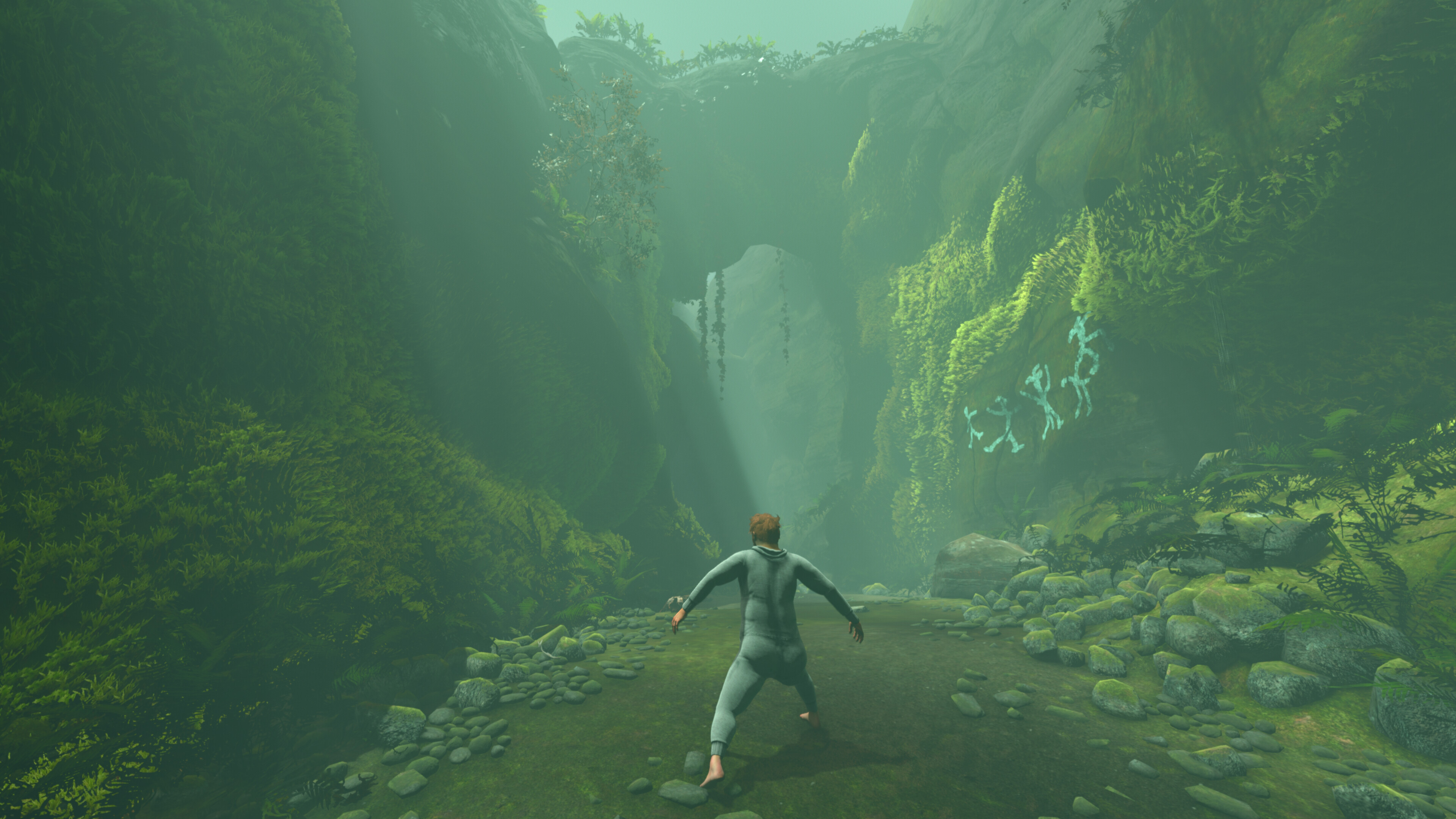
I caught up with Boch three weeks after Baby Steps’ release date to see if she was feeling more done, now that the launch-day dust had settled. She said it was a hard question.
“There is so much more that I am interested in exploring, and so much more that I have set up in terms of pins to knock down,” she said. “I think this is a struggle that highlights the inherent tension of trying to make art at this boundary between a fine art practice and a commercial art practice. I think that for the sake of the work, and for the sake of me and my team as artists, the tech I have built deserves to continue to be refined in a different context, one wherein sound is more paramount. That's where we're headed.”
This is a tease of what’s next for Boch, even though she’s still finishing up Baby Steps. She’s planning on leaving NYU, spurred by the unpredictability of her health, but she’s not done making games. Her next one will be more personal.
“It's important to me to share what I'm doing with people,” Boch said in September. “I think that there is not enough in the world of games that puts audio at its very center. I think that my personal ambitions and future ambitions are definitely leaning more in that direction by the day. I had a long time of needing to get some space from interactive audio as The Thing. Where my winds are blowing is in that direction.”
Baby Steps exists in its current form because Boch and her teammates were able to adapt and endure. They were honest about what was working, what wasn’t and what could, and they leaned into the aspects that felt the most natural to them. Boch in particular set aside her ego, listened to her body, and took things day by day. You know, baby steps.
“The process of transition is one that involves an enormous amount of self-reflection and a growing sense of self knowledge,” Boch said. “Ultimately, that process for me was kind of orthogonal to the storytelling of Baby Steps. There's a lot that comes from lived experience, and from commiserating and sharing that lived experience between Bennett and Gabe, and you can see that very clearly in the work. There's also just ways in which that process was illuminating to me in terms of inherent differences. There's an aspect of it that came alongside the necessity of slowing down, and then the subsequent necessity of staying inside that hit with my chronic illness and then Covid. There was a way in which I was more with myself at that moment than I’ve ever been.”This article originally appeared on Engadget at https://www.engadget.com/gaming/baby-steps-isnt-done-with-maxi-boch-140000613.html?src=rss














